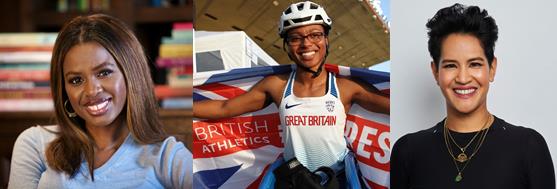We are at a crossroads in human history.
Shaken by a global pandemic, climate change and global social equity movements, there is an urgent need for leaders across sectors to collaboratively envision and build a more inclusive and sustainable society. Such was the message of last week’s World Economic Forum (WEF) Annual Meeting, which referred to this critical moment as The Great Reset.
Boster Group knows the power of purpose-driven partnerships to drive this Great Reset. Recognising the weight of our joint challenges, this moment demands collective action and the sharing of best practices. That is why we used our platform at the WEF last week, in partnership with The Female Quotient, to bring together three visionary leaders in media and sport to share their stories and best practices for driving the change our world needs.
Boster Group Founder and CEO Susan Boster was joined by June Sarpong (Director of Creative Diversity, BBC), Virginia Rustique-Petteni (VP of Purpose Communications, Nike) and Kare Adenegan (Paralympic Medallist in Wheelchair Racing, Team GB). Together, these women shared three key messages for how purpose-driven leaders can drive The Great Reset:

For over 20 years, Boster Group has supported global corporations to demonstrate their purpose through the power of partnership. We have found that a deeply felt sense of each partner’s purpose and value proposition enables even greater collective potential, just as each individual’s purpose plays a role in achieving organisational success, as our panellists exemplify. For example, Virginia Rustique-Petenni shared that her purpose sits at the nexus of stakeholder collaboration, drawing on her experience working between government, civil society and the private sector. Last summer, she activated this purpose with and through her company when Nike teamed up with non-partisan organisations Rock the Vote and When We all Win to encourage civic engagement across key cities in the United States, leveraging the power of athletes’ voices to create change. A witness to the individual potential for impact in the context of collective action, Virginia encourages self-awareness.
As one of only a few black, female Paralympians, Kare Adenegan feels an intense responsibility to live her purpose: inspiring others – especially those who face exclusion – to enter the world of sport. She acts in collaboration with her team and coaches to maximise the potential of her platform to drive change – creating the Instagram Live Series Race and Disability.
June Sarpong, too, recognises her unique ability to speak on behalf of those who are not in the room. She designs inclusive policies for the BBC, not from an academic perspective, but from lived experience. June seeks to understand and collaborate with senior decision-makers to create space for more seats around the table. June’s next book, The Only One in the Room, is expected later this year.
“It’s in the trying and the failing that you win. That’s where you’re tested, where you’re learning, where you’re growing.” – Virginia Rustique-Petteni
According to Edelman’s 2021 Trust Barometer, 68% of global survey respondents agreed that CEOs should step in when governments fail to address societal problems. 86% expect CEOs to speak publicly about pressing social challenges. While these expectations exist across industries, they are more palpable – and often controversial – in the highly visible sectors of media and sport.
As senior leaders at the BBC and Nike respectively, both June and Virginia attest that mistakes are inevitable. Individuals and corporations will fall short of delivering on their purpose and meeting public expectations. Purpose-driven leaders must learn to accept and prepare for controversy.
According to June, building trust with your audience is essential, and trust begins with communication. Responding quickly and apologising when a mistake has been made is important. However, June believes, sharing the good news is just as important. Too often, companies are frighted to share progress, for fear they fall short of perfection.
Virginia agrees. Recognising that Nike “has been humbled more than once,” she emphasises that mistakes cannot keep you from trying.
The Great Reset cannot be achieved without inclusive leadership. Kare believes that inclusion starts with representation, pointing out that on the UK Athletics Board there is only one black, disabled woman. “More needs to be done,” Kare demands. Disabled athletes’ interests will only be recognised when more disabled people are represented on the Board.
As highlighted in June’s latest book, The Power of Privilege, purpose-driven leaders need to “redefine what it means to win.” June explains that the key to purpose-driven partnerships is identifying win-win opportunities. For instance, the Swiss fragrance company Firmenich specifically hires blind candidates, recognising the unique value of their heighted sensory capabilities. June maintains that this is exactly the type of win-win situation leaders need to identify at scale. To realise the power of inclusion, we must truly value the richness of gender, racial, ability and all types of diversity.
“Leading with purpose is doing what you know you are good at to the best of your ability in pursuit of the greater good.” – Virginia Rustique-Petteni
Purpose-driven leaders and organisations alike must understand their value proposition and role as they collaborate with stakeholders across sectors to achieve key business and social objectives. They must drive progress, accepting that failure is inevitable and bolstered by success. They must truly believe that the power of inclusion is one of their greatest assets. If we are to achieve The Great Reset, we must do so together, valuing the role we each have to play.
Interested in hearing more? Watch the full conversation as it happened.